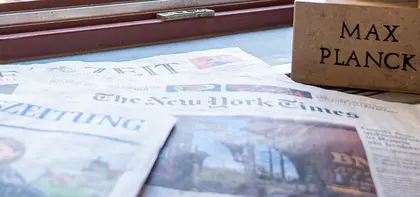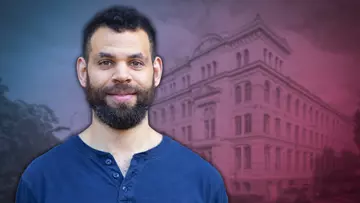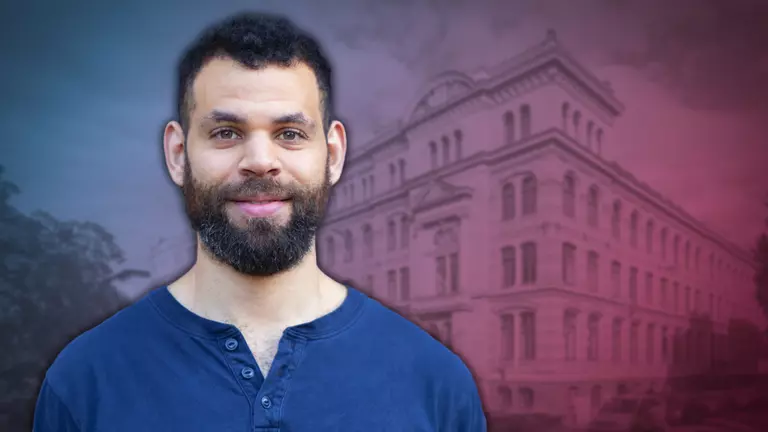
Bestmöglicher Ort für meine Forschung – Im Gespräch mit Peter Morfe
Veröffentlicht am 22.01.2024
Peter Morfe hat eine der prestigeträchtigsten wissenschaftlichen Auszeichnungen weltweit erhalten, ein Postdoctoral Research Fellowship der American National Science Foundation NSF. Er wählte unser Institut als bestmöglichen Ort für sein Forschungsprojekt zu „Degenerate, anisotropic elliptic and parabolic partial differential equations“.
Das Ziel der Mathematical Sciences Postdoctoral Research Fellowships der NSF ist es, zukünftige Spitzenforscher in den Bereichen Mathematik und Statistik zu fördern. Mit dem Programm werden Postdoc-Aufenthalte an Forschungseinrichtungen ermöglicht, die einen maximalen Beitrag zur künftigen wissenschaftlichen Karriere leisten. Peter geht davon aus, dass sein Forschungsaufenthalt an unserem Institut unter der Mentorschaft von Felix Otto einen großen Einfluss auf seine Forschung und seine zukünftige wissenschaftliche Laufbahn haben wird. Am Institut schätzt er besonders die offene Atmosphäre und den Austausch mit den Wissenschaftlerinnen und Wissenschaftlern vor Ort.
Wir haben uns mit Peter unterhalten, um ein paar tiefere Einblicke in seine Arbeit und sein Leben hier in Leipzig zu erhalten.
Dieses Interview wurde in englischer Sprache geführt.
- You completed your PhD at the University of Chicago. With the postdoctoral grant endowed with 170,000 euros, you have acquired one of the most prestigious fellowships. What encouraged you to move to Leipzig to our Max Planck Institute? Could you please briefly describe your field of research? In particular, where do you see interfaces with the research of Felix Otto's group?
The impetus to move to the MPI came from my adviser, Takis Souganidis, who suggested I ask Felix Otto to sponsor me for the NSF fellowship. My main area of research is the analysis of elliptic and parabolic partial differential equations, with particular expertise in the theories of homogenization and viscosity solutions. Felix Otto has made major contributions over the past ten to fifteen years in homogenization theory, so that's an immediate overlap between our research interests. Some of my thesis research drew connections between gradient flows, homogenization, and statistical mechanics, which also ties in nicely with multiple focus areas of Otto's group.
- You have been with us at the MPI for a few months now. How do you feel about your stay, what do you particularly appreciate?
Working at MPI is basically like my dream job. When I was an undergraduate, my mother asked what I thought I would be doing as a math professor, and I replied, "Going to the library and doing research." Indeed, today I very much enjoy reading and working on math problems at MPI's library.
- What drives/motivates you in your work?
I became interested in mathematics as a means of describing the universe. As far as an interest in science is concerned, the first inspiration I can remember came from a chemistry class, where the professor was describing, in vaguely mathematical terms, the kinetic theory of gases. The idea that math can explain how the interaction of atomic particles gives rise to macroscopic physics still fascinates me.
Today curiosity is still the biggest motivating factor for me. There is a huge amount of beautiful mathematics out there that combines elements of physics, analysis, and probability, the subjects I enjoy the most, and the prospect of slowly learning it and contributing to it is tantalizing to say the least.
- What do you think, how important is your time at the MiS both for your personal development and your scientific career?
It remains to be seen! It's a special time in my life, that's for sure. I was always fascinated by European history as a kid and dreamt of living there, so getting to live in Germany is a huge milestone for me personally. In terms of career, my hope is the time at MPI will help define my career going forward --- for instance, which problems I'll work on, who I'll collaborate with.
- Besides mathematics, do you have any other passion that makes you happy?
I enjoy reading and writing in general. Reading a book is really calming. Lately, I'm drawn to nonfiction, especially history. The history of quantum mechanics in particular is a subject I keep coming back to. It’s fun discovering the lives of the people behind the science. I'm slowly reading a biography of Max Planck at the moment, and after that I would like to learn more about the life of Boltzmann.
- What do you like about Leipzig? Do you have a favorite place or favorite food?
I'm captivated by the architecture. For instance, across from the institute there is a building that I was told is from the turn of the 19th century that I rather like. Of course, the Neues Rathaus is from the same period and it's such a statement in itself. I'm really curious to learn about the architecture from around that time in German history. I find it very distinctive.
- What does this fellowship entail for your future career? What would you like to accomplish?
Being at the MPI is an opportunity to broaden the scope of my research and start new collaborations. So far, I have learned a lot working with Felix Otto, and it's inspired me to start thinking about anomalous diffusion and turbulent transport. Through our seminar at MPI, I have gotten to meet a number of mathematicians in Europe. Quite possibly we will work together in the future, we have similar interests.
As far as accomplishments, the first goal is always learning more math and making progress on research problems. Specifically, I have two ongoing collaborations related to the homogenization of geometric flows --- it is starting to look like these will bear fruit soon. But I think I have to be careful about not getting too lost in my own research. I'm trying to be more aware of my colleagues' work and more open to the possibilities. There is a lot of activity related to stochastic partial differential equations, for instance, and I'm starting to realize it's a vital area of research with a lot to offer.
- What are your plans for the future? Where do you hope your next career step will take you?
My plan is to continue pursuing an academic career. The ultimate goal is a tenured professorship at a research university. As far as the next step, a tenure-track assistant professorship in the US is my goal.
We wish you much succcess and all the best!
Wissenschaftlicher Kontakt
Redaktioneller Kontakt
Weiterführende Informationen
-
personal-homepages.mis.mpg.de
Persönliche Webseite von Peter Morfe
-
Mehr anzeigen
Informationen zur Forschungsgruppe „Pattern Formation, Energy Landscapes and Scaling Laws“


